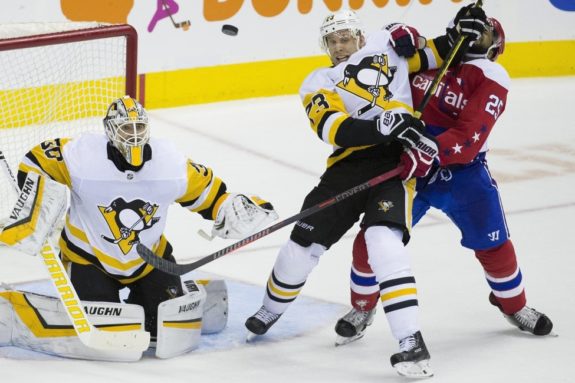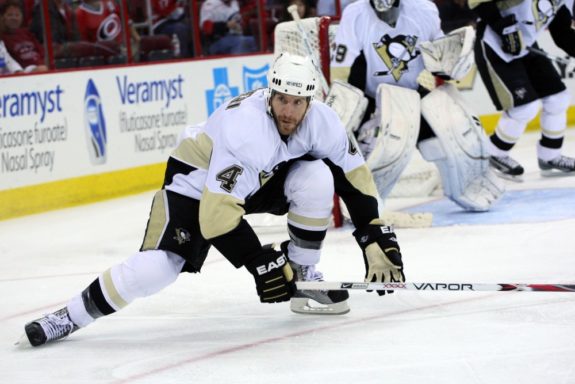
Every team’s offseason moves lead to discussions and debates, but no signing in recent Pittsburgh Penguins history has met with as much skepticism and consternation as Jim Rutherford’s signing of defenseman Jack Johnson.
Having failed to shore up his defensive corps with the addition of Matt Hunwick the year prior, Rutherford inked Johnson to a five-year, $16.25 million contract last offseason and the blow-back was immediate.
Jim Rutherford Sparks a Firestorm
While some assumed the move was driven by Johnson’s longstanding friendship with Sidney Crosby, others opined that Rutherford was still intrigued by Johnson whom he had been forced to trade away after drafting him with the third-overall pick in the 2006 NHL Entry Draft, just two picks behind the captain of the Penguins.
Related: Kris Letang Personifies the Penguins’ Problems
Whatever the reason, it simply couldn’t be that a three-time Stanley Cup-winning general manager thought that Johnson was going to improve the Penguins, could it? Nor could it be that head coach Mike Sullivan, widely regarded as one of the best in the NHL, really believed Johnson was a “solid defenseman,” could it?
Given the dismay from Johnson’s outspoken critics and the analytics crowd, many of whom seem to view the hockey world through Corsi-colored glasses, apparently it could.

Despite the outcry from those who viewed the move as a mistake that doomed the Penguins’ chances to win another Stanley Cup, Johnson quickly earned the trust of the coaching staff as reflected in his ice time (19:17 per game) which was surpassed only by Brian Dumoulin and Kris Letang.
Johnson Plays Throwback Style
While critics will point to Johnson’s career minus-113 and poor analytics as reasons for their outcry, they would be wise to remember a former Penguins defenseman who played a similar style of hockey but was viewed by fans in a much more positive way: Rob Scuderi.
A fixture on the defense for five seasons in Pittsburgh and a key member of the 2008-2009 Stanley Cup champion Penguins, Scuderi, like Johnson, played a gritty and unspectacular style of hockey, usually faced the other team’s top line and led the team in blocked shots, and even added a key save.
Not known as a great puck-mover or skater, Scuderi is nonetheless remembered fondly as the anchor of the team’s defense by fans, many of whom now dismiss Johnson as a ball and chain that is weighing the Penguins down.
However, a closer look reveals that Scuderi’s 2008-2009 season statistics (1 goal, 15 assists and 46.1 Corsi for percent (CF%) are strikingly similar to Johnson’s performance this season (1 goal, 12 assists and 45.8 CF% ).

While Scuderi had the advantage of being paired with a reliable partner in the imposing Hal Gill, Johnson was not as fortunate, as his intended partner, Justin Schultz, missed most of the season with a broken leg. As a result, Johnson was switched to the right side and was asked to shepherd less experienced defensemen like Juusso Riikola and Marcus Pettersson.
Johnson’s Value Overlooked
While the addition of the younger Eric Gudbranson may make Johnson the odd man out and possibly trade bait this offseason, that doesn’t mean, contrary to what his critics say, that Rutherford views signing him as a mistake.
Related: Penguins’ Gudbranson Trade Infuriates Some Fans
The fact is, Johnson led the Penguins in blocked shots (147) and hits (233). He was the only defenseman to play in all 82 games and was charged with the fewest giveaways among the team’s regular defensemen (32) and too often found himself as the lone defender facing odd-man rushes due to ill-timed pinches or lazy back-checking.
In short, he was exactly the player that the front office and the coaching staff counted on him to be and, on a team that too often showed a lack of accountability, that kind of dependability should not be overlooked.